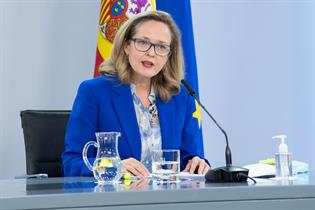Extraordinary Council of Ministers
Government allocates 11 billion euros to support companies and self-employed from consequences of COVID-19
Council of Ministers - 2021.3.12
Moncloa Palace, Madrid
The Council of Ministers approved a raft of extraordinary measures to support the solvency of companies in response to the pandemic. The Minister for the Treasury and Government Spokesperson, María Jesús Montero, stated that the government thus continues the work it has been carrying out since the declaration of the first state of emergency a year ago to minimise the impact of COVID-19 on the productive fabric and on jobs.
 Foto: Pool Moncloa/Borja Puig de la Bellacasa"Never before has an effort of this magnitude been made, aimed at companies and workers as a whole", said María Jesús Montero, who highlighted that the government has also protected the well-being of families and the quality of public services.
Foto: Pool Moncloa/Borja Puig de la Bellacasa"Never before has an effort of this magnitude been made, aimed at companies and workers as a whole", said María Jesús Montero, who highlighted that the government has also protected the well-being of families and the quality of public services.
Despite the economic crisis, remarked the Government Spokesperson, the regional governments have received the largest volume of financing ever in 2020 and 2021 to guarantee the functioning of such essential services as health, education and care for the most vulnerable.
Anticipate solvency problems
The Third Vice-President of the Government and Minister for Economic Affairs and Digital Transformation, Nadia Calviño, explained that the measures seek to anticipate potential solvency problems due to the restrictions on activity in the sectors and regions hardest hit by the pandemic. "We are seeking to alleviate the fall in income and over-indebtedness that can endanger the survival of perfectly viable companies which will hold back the recovery", she stressed.
The Third Vice-President of the Government underlined that the daily activity indicators point to a slowdown in the first quarter of 2021, in line with other European countries during the third wave of the pandemic, but the forecasts of all agencies point to an improvement during this year and in 2022. The most recent figures on the job market also confirm this trend, including a drop in the number of workers under Temporary Lay-off Plans (Spanish acronym: ERTEs).
Nadia Calviño indicated that the Lines of guarantees of the Official Credit Institute (Spanish acronym: ICO), together with the ERTEs, have been key in maintaining the productive fabric, channelled through the financial sector - more than 121 billion euros have been mobilised - as have the extraordinary benefits for the self-employed, the banking, tax and National Insurance moratoriums and other exemptions.
The support rolled out in 2020 amounted to 20% of the Gross Domestic Product (GDP), and with the amounts agreed on Friday, the total scheduled for this year already exceeds 2%. "A major and essential fiscal effort, which has been highlighted by European institutions for its efficacy and magnitude", she stated.
New funds and extension of moratoriums
The minister claimed that we still face some complicated weeks ahead and that we must anticipate the risk of a significant deterioration of the balance sheets of companies and a rise in indebtedness. The Royal Decree-Law approved on Friday seeks to continue protecting the sectors that have been hardest hit but which are still primarily viable, until such time as a significant percentage of the population has been vaccinated. "By acting at the right time, as we have since the outset, we can avoid a greater cost in the future", she argued.
The new legislation is structured through three funds: a line of 7 billion euros in direct aid for companies and the self-employed, allocated to the payment of fixed costs and debts with suppliers and other creditors; a line of 3 billion euros so that the ICO can accompany processes to restructure financial debt and a 1-billion euro fund for the re-capitalisation of the companies affected.
In addition, the moratoriums on insolvency proceedings and the flexibility measures in the field of justice are extended to the end of the year to offer a period to allow the re-establishment of equity balances and to address re-structuring processes, among other actions.
COVID line of direct aid
This line will allow regional governments to grant direct aid to companies and the sectors hardest hit by the pandemic. It has two compartments: the first, with 2 billion euros specifically for companies in the Canary and Balearic Islands - the regions where the tourism sector has the greatest weight - and another with 5 billion euros for the rest of the regions, which will be distributed according to the indicators on income, general unemployment and youth unemployment.
 Foto: Pool Moncloa/Borja Puig de la BellacasaThis support is non-repayable and final and must be allocated to the payment of debts taken on since March 2020, both outstanding bills to suppliers and such fixed costs as bank and financial debts, energy supplies, etc. Those companies and independent contractors whose income has fallen by a minimum of 30% on 2019 may have access to this support, provided they fall under the list of almost 100 sectors and activities that have been the most prejudiced by the restrictions.
Foto: Pool Moncloa/Borja Puig de la BellacasaThis support is non-repayable and final and must be allocated to the payment of debts taken on since March 2020, both outstanding bills to suppliers and such fixed costs as bank and financial debts, energy supplies, etc. Those companies and independent contractors whose income has fallen by a minimum of 30% on 2019 may have access to this support, provided they fall under the list of almost 100 sectors and activities that have been the most prejudiced by the restrictions.
This aid may offset up to 40% of the additional drop in income for micro-SMEs and the self-employed, and up to 20% for other companies. A fixed amount of 3,000 euros is established for those independent contractors that are taxed under the module basis and a range of 4,000 to 200,000 euros by company for the others.
Nadia Calviño remarked that these 7 billion euros come on top of the 24 billion euros already transferred by the State to the regional authorities to provide a health, economic and social response to the pandemic.
Line to restructure financial debt
In the processes to restructure viable companies with temporary difficulties agreed with financial institutions, three levels of action may be applied to loans with public guarantees.
The first level is an extension to the deadline for the maturity of loans, in addition to the extension approved last November. Under the second level, these loans may be converted into shareholder loans, maintaining the coverage of the public guarantee. Under the third exceptional and last-resort level, direct transfers may be made to the self-employed and SMEs to reduce the principal of the guaranteed financing taken on during the pandemic.
In order to structure these measures, remarked Nadia Calviño, a Code of Good Practices will be approved so that the financial sector and other bodies can become involved in supporting these companies.
Fund to re-capitalise companies
This fund will be managed by the Spanish Company for Development Finance (Spanish acronym: Cofides), attached to the Ministry of Industry, Trade and Tourism, which complements the larger SEPI fund to re-capitalise strategic companies.
Its use will involve the State's participation in all future profits of these companies, as well as an exit strategy, since the temporary nature of the fund is set at eight years, specified the minister.
Requirements for access
 Foto: Pool Moncloa/Borja Puig de la BellacasaIn order to gain access to all these new forms of support, companies must maintain their activity until 30 June 2022, and may not distribute dividends or increase senior management remuneration for two years, while complying with other standard requirements (not have their tax residence in a tax haven, not be involved in insolvency proceedings or have ceased their corporate activity at the time of the application, be up-to-date with the payment of tax and National Insurance obligations, etc...).
Foto: Pool Moncloa/Borja Puig de la BellacasaIn order to gain access to all these new forms of support, companies must maintain their activity until 30 June 2022, and may not distribute dividends or increase senior management remuneration for two years, while complying with other standard requirements (not have their tax residence in a tax haven, not be involved in insolvency proceedings or have ceased their corporate activity at the time of the application, be up-to-date with the payment of tax and National Insurance obligations, etc...).
María Jesús Montero specified that the Royal Decree-Law provides that within a period of one month and ten days, the government will have formalised the order for the distribution of the fund to the regional authorities after signing the corresponding agreements, in order for the funding to be available to bolster the productive fabric as soon as possible.
Nadia Calviño underlined that the Royal Decree-Law provides for an "unprecedented raft" of instruments to support companies with solvency problems, always with the aim of maintaining corporate activity and jobs. This is the fundamental goal for the coming months, which requires focusing efforts in four priority areas: controlling the pandemic and speeding up the vaccination process, guaranteeing financial stability, avoiding a structural impact on the productive fabric and quickly and effectively rolling out the Recovery, Transformation and Resilience Plan.
Current affairs
When asked about a potential extension to the state of emergency after 9 May, María Jesús Montero stated that the government "does not have a pre-determined position" on this matter. Any decision, she said, will depend on the epidemiological variables and the cumulative incidence rate of the disease in the 14 days prior to its finalisation.
As regards the administration of the AstraZeneca vaccine in Spain, following the notification of several cases of thrombotic effects in other European countries, the Government Spokesperson reported that no types of adverse reactions have been reported in Spain that advise against its use.
María Jesús Montero asked the public to remain calm and praised the pharmacovigilance system of the Spanish health system, which monitors and records any adverse effects.
Non official translation





